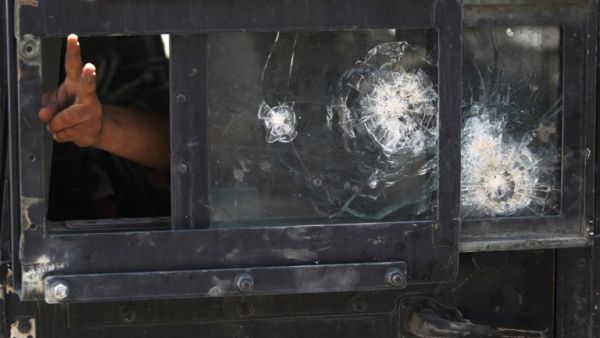Iraqi security forces are set to declare victory in Mosul within hours with local media reporting that Islamic State has been all but forced out of the city.
The country's state broadcaster said: 'We are seeing now the last meters (of the battle) and then victory will be announced. It's a matter of hours.'
A military spokesman cited by the TV station said the insurgents' defence lines were collapsing following months of fighting.
Government forces backed by the US-led coalition have been trying to drive out the terror group from the strategic city since October.
This morning they killed 35 ISIS jihadis and wounded six others while advancing into the Old City neighbourhood.
It is thought that just a few hundred militants remain in a confined area overlooking the Tigris River - which divides the city's east and west.
Hundreds of thousands of people have fled Mosul as the Iraqi government continues to battle ISIS fighters, which was once a stronghold for the terrorist group.
Iraqi forces have made progress, liberating eastern Mosul in January of this year, but ISIS has been rebutting with violent attacks as the group loses more ground.
Despite clinging to only a sliver of territory in Mosul, desperate militants launched a counterattack yesterday reversing days of Iraqi army territorial gains in a matter of hours.
The dramatic offensive began just after noon, when as many as 100 fighters began firing on units of the Iraqi army's 16th Division charged with holding the northwest frontline in Mosul's Old City neighborhood.
The attack broke through the army's first line of defense and the rest of its lines soon crumbled.
The surprise attack illustrated the resilience of the extremists who have maintained the ability to conduct both conventional military counterattacks and insurgent strikes.
Hassan, a 45-year-old soldier with the 16th Division, described the close-fought battle inside the rubble-strewn alleyways of the Old City.
'Daesh started to attack us from everywhere. We were so close to them that we even fought with hand grenades.
'We have lots of martyrs and wounded soldiers, but we can't evacuate them. It was epic.'
The initial wave of Iraqi army casualties began arriving within an hour at a field hospital a few hundred metres from the front, carried on stretchers by medics.
The neighborhood's narrow roads, once passable on motorcycles, are now covered with rubble and downed power-lines.
The footpaths that lead in and out of the Old City wind through houses, across rooftops, beside airstrike craters and down into basements.
At least five soldiers were killed and 25 wounded, said a doctor at the field hospital.
The Iraqi military was forced to pull back about 75 metres behind a row of buildings along one of the Old City's few main roads, an Iraqi officer overseeing the operation said.
It comes following similar counterattacks in recent months by ISIS jihadis.
In late June, some 200 of the caliphate's soldiers dressed in fatigues that resembled the Iraqi military's Shiite militia allies launched an offensive on two neighbourhoods along Mosul's western edge.
Iraqi army units crumbled and special forces had to be dispatched to the area along with coalition surveillance and air support. The reallocation of resources stalled the Old City push which was then on its early days.
In mid-June more than 100 ISIS fighters launched a large-scale counterattack from the Old City's southern front on Federal Police units stationed there, killing 11 and seizing armoured vehicles and weapons.
Despite the setbacks, coalition spokesman US Army Col. Ryan Dillon said the counterattacks were costing the terror group large numbers of fighters and not having an impact on the overall operation to defeat the militant group.
Once Mosul is liberated, Dillon said, Iraqi security forces 'can completely focus on not just a conventional fight but also on security and holding that ground'.








